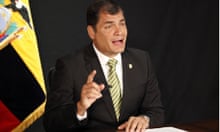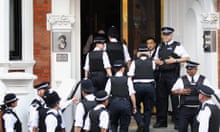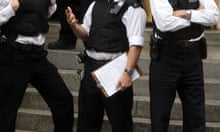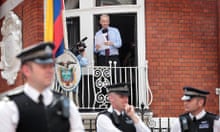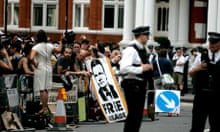As defined by the United Nations convention on refugees, a refugee is a person who "owing to well founded fear of being persecuted for reasons of race, religion, nationality, membership of a particular social group or political opinion, is outside the country of his nationality and is unable or, owing to such fear, is unwilling to avail himself of the protection of that country". A little later on, the text of the convention specifically states that refugee status "shall not apply to any person with respect to whom there are serious reasons for considering that … he has committed a serious non-political crime outside the country of refuge".
Whatever views one may have about Julian Assange as a WikiLeaks activist, it is clear that in legal and moral terms he cannot properly be described as a refugee. To be a refugee is to be in need of very specific protection, desperately won and deservedly cherished. Refugee protection does not apply to Mr Assange and it is wrong of him to claim it. As Charlie Chaplin said when a Nazi newspaper reporter once asked him in Berlin if he were Jewish, he does not have that honour. But the inappropriate nature of the claim goes further. Since Mr Assange is wanted by the courts in Sweden for the specific and proper purpose of answering two allegations of sexual assault, which is in anyone's language a serious non-political crime, it is also clear that he is specifically disbarred from being treated as a refugee.
None of this fundamental aspect of Mr Assange's status was discussed in any serious way on Thursday by the Ecuadorian foreign minister, Ricardo Patiño, in his long statement on the case in Quito. Mr Patiño made plenty of other points before confirming Ecuador's decision to grant asylum to Mr Assange. Most of these were based on the claim that the United States wants to get its hands on Mr Assange because of WikiLeaks, that it may torture him, that his deportation to Sweden by the UK would bring this closer, and that Ecuador has a right to protect him.
No one should be naïve about the US, but this is a fallacious chain of reasoning. The US has not said whether it wants to detain Mr Assange, though it has had plenty of time to do so. If it wanted his extradition, the US might logically be more likely to make use of Britain's excessively generous extradition treaty with the US – which has not happened – rather than wait until he was in Sweden, when both Sweden and the UK would have to sign off on any extradition application. And neither Sweden nor the UK would in any case deport someone who might face torture or the death penalty. Ecuador's own human rights record is also far from exemplary, as Human Rights Watch has made clear.
Yet two wrongs do not make a right. Just as Ecuador is wrong to pretend that Mr Assange is a refugee, so Britain is wrong to threaten to enter Ecuador's London embassy. The Foreign Office may have been factually entitled to remind Ecuador this week that a 1987 act allows it, if permissible under international law, to enter the premises. But the reminder is more trouble than it is worth, and risks being massively counterproductive to this country's interests in places where fewer scruples apply. The threat was a mistake, allowing Ecuador to shift the argument away from the Swedish criminal charges. Our diplomats in hostile or failing states would be put at unacceptable risk if this threat were carried out.
Thursday's events do not change the realities of the Assange extradition case. Mr Assange remains in this country. He is the subject of an extradition order that has been issued under due process. He cannot leave the embassy without being arrested – an embassy car is not diplomatically protected. Ecuador has found a way to tweak the tail of the imperialist lion, but the law is not on Ecuador's side and, in the end, the law should be upheld. Mr Assange should be extradited to answer Sweden's criminal allegations. In the meantime, Britain should concentrate on being patient and doing the right thing.

